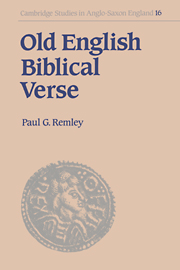Book contents
6 - Conclusion
Published online by Cambridge University Press: 30 September 2009
Summary
The distinctive biblical emphasis of the Junius poems, above all, indicates that they possess a common hermeneutic. This critical term has been invoked so frequently in recent scholarship, acquiring a bewildering range of connotations, that its use here is undertaken with some trepidation. But biblical hermeneutics has historically addressed the processes by which meaning is extracted from canonical texts, and this may justify its mention in connection with the Junius poems, if only to assist in establishing a general point that bears on many of the arguments of the present study.
Genesis, Exodus and Daniel all embody reflexes of a known source–the canon of the Old Testament. It is true that each of the compositions preserved in Junius 11 stands in a fundamentally different relationship to the biblical text, but it does not appear that any of their verse sets out deliberately to flout the meaning of scripture. The Junius poets' individual responses to biblical, or biblically derived, texts must in some measure be seen to reflect their preferred interpretations of matter drawn from (or going back to) the Old Testament. As we observe in texts emerging from all phases in the transmission of biblical texts, the words of scripture frequently may be construed in multiple senses and the import of entire episodes often defies intuitive apprehension. The present study has thus striven to identify interpretative difficulties in the texts of Genesis, Exodus and Daniel and to establish the Junius poets' varying responses to these textual cruces as precisely as possible.
The preceding chapters are centrally concerned with the characteristic features of the biblical interpretations extracted by Anglo-Saxon poets from their source-texts–especially the texts of the Old Testament.
- Type
- Chapter
- Information
- Old English Biblical VerseStudies in Genesis, Exodus and Daniel, pp. 435 - 447Publisher: Cambridge University PressPrint publication year: 1996

